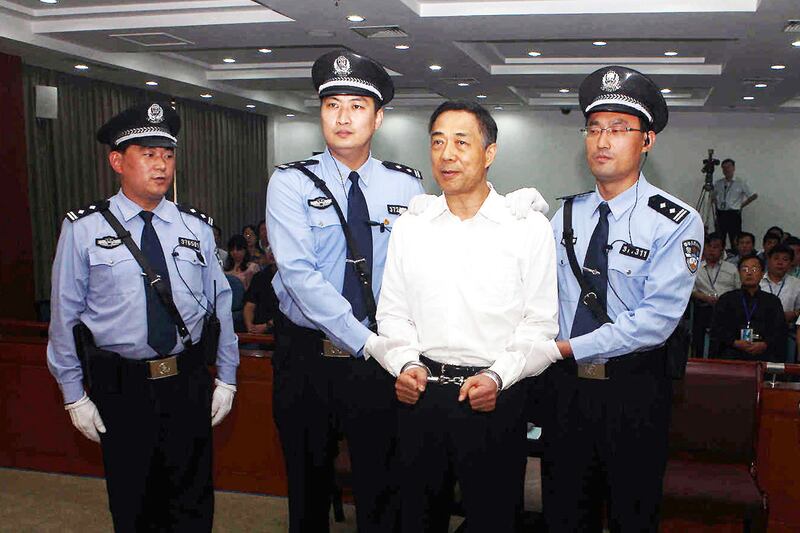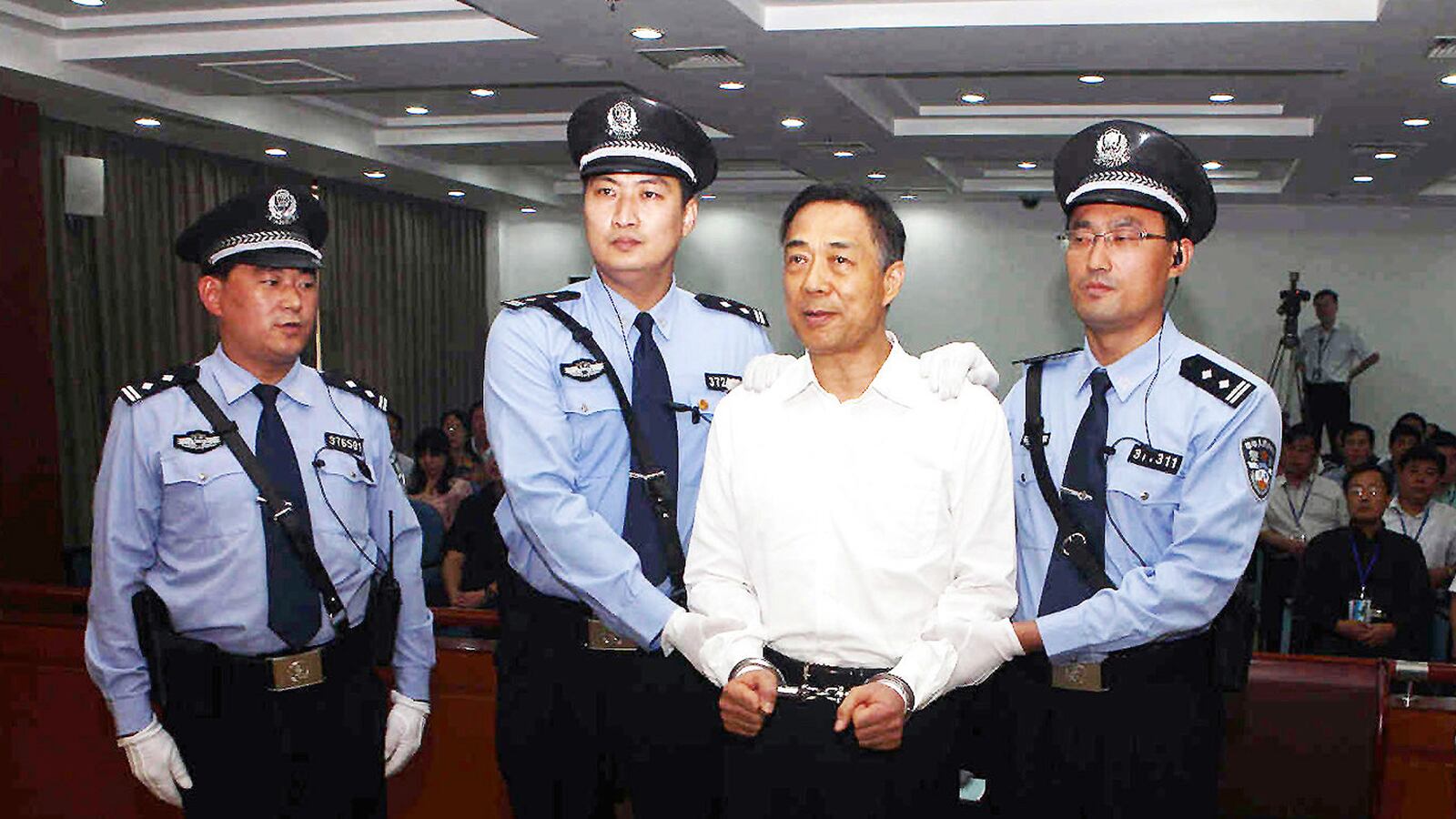Following a month-long deliberation, a Chinese court, closely guarded by hundreds of armed police, rejected the majority of the defense arguments of former Politburo member Bo Xilai, a princeling and rising political star, and sentenced him to life-long imprisonment for corruption, embezzlement, and misuse of power. All of his personal assets will be confiscated.
The proceeding was broadcast on the court’s microblogging site. Following the verdict, Bo, who kept a smiled the entire time, was handcuffed and taken away. With his conviction, he will follow the steps of his wife, who received a suspended death sentence last year for killing a British businessman over economic disputes. Part of Bo’s charges were related to covering up for his wife.

A Beijing insider, who leaked the news of Bo’s verdict announcement date to an overseas Chinese website a week before, says Beijing had a hard time reaching consensus over Bo’s case. “If the Chinese senior leadership intends to end a long, drawn-out and divisive political scandal and restore people’s confidence in the ruling Communist Party, the verdict will further widen the rift,” he stated.
The political division has manifested itself in recent state media coverage. While government-controlled newspapers and websites launched fierce attacks during and after the trial, calling Bo “a corrupt element” who “cunningly denies his crimes” in the face of mounting evidence, a party's top theoretical journal—Qiushi, or Seeking Truth—lavished praises in a commentary on the idea of the Party’s efforts to pursue “common prosperity.” This slogan has been ostentatiously associated with Bo’s populist social programs in Chongqing, where he was the party chief. The author, with the name of “Stubborn Stone” even implied that Bo was a “brave national hero.”
There have been reports that the party’s propaganda department will now launch a media blitz in support of the verdict.
The court decision came as a victory for Bo’s opponents, who urged a suspended death penalty for "a big tiger" and “a ruthless opportunist” who was corrupt and who persecuted thousands of officials and businessmen in the name of fighting crime during his reign in Chongqing. The prosecution also cited Bo’s uncooperative attitude in court as the basis for tougher sentencing during his trial in August, when he launched a vigorous defense—recanting his previous confessions, vehemently denying all charges, and alleging coercion by the party’s anti-corruption agency.
Bo’s harsh sentencing will no doubt gain more sympathizers and trigger a backlash among his supporters, many of whom were princelings—children of senior party veterans and disenchanted members of the public who benefited from Bo’s Maoist social welfare programs, observers say. Some called for his release or expected 15 years or less in their online articles. They believe Bo is a victim of a political power struggle and that those who have brought him down are more corrupt. “Tell me which official is clean? Everyone is corrupt. So is Bo Xilai,” a pro-Bo resident in Chongqing tells the BBC.
The severe punishment will effectively destroy Bo’s chance for a comeback and deter future defiance by disobedient officials in court, says Chen Xiaoping, a New York-based Chinese legal scholar.
On the other hand, Chen says Bo supporters can take comfort in the fact that he has been spared the death penalty and will enjoy medical parole in two to three years, if not sooner. “Even after he’s kicked off the political stage, Bo will stand as a powerful political symbol and an opposition figure. His followers will rally around him and constantly challenge the policies of the new leadership,” he adds.
He says Bo's legacy lives on. The current leadership has displayed over the past nine months similar leftist political orientation and tougher policy preferences, initiating Maoist campaigns that are reminiscent of those advocated by Bo.
***
For the public which was accustomed to watching brief TV clips of defendants admitting crimes and offering apologies to the Party during speedy trials conducted behind closed doors, Bo’s five-day trial, which featured many dramatic and defiant moments, was an eye opening experience. Parts of the proceedings were broadcast on the court’s microblog site.
In his interview with state media, He Jiahong, a professor at Chinese People’s University says the court’s decision to broadcast the proceedings was unprecedented, reflecting the “decision-makers’ determination to push for judicial openness and the confidence of the court” in handling the Bo case independently.
However, many questioned the concept of the live-broadcast, which was edited and highly selective. The court omitted some details that could arouse public sympathy for Bo and hurt the prosecution and the senior leaders. For example, his statements of how the party’s anti-corruption body coerced and threatened him during the interrogation never showed up in the official transcript.
“The partial live coverage is aimed at manipulating public view and boosting the legality of Bo’s case because the public questioned the basic premise of the trial,” says Sun Yan, a professor at Queens College, City University of New York. “Many in the public believe the party leadership controls the court and uses corruption charges to justify the ouster of political opponents.”
Moreover, Yang, a journalist in Beijing says in a telephone interview that the media have played up some of Bo’s "out of context" statements, especially his allegations that his wife and former police chief had an illicit affair. “Those remarks turned a political case into a farce that involved corruption and sexual trysts.”
While touting the court’s use of microblogs as a positive step toward judicial transparency, the government is also launching a large-scale crackdown on online “rumor-mongering” to stifle dissenting views. This month, China's top court that says bloggers can be prosecuted for posting rumors seen by more than 5,000 people, or forwarded more than 500 times. This week, police in China’s northwestern province of Gansu detained a teenager for “disrupting social order” when he questioned a suspicious death in his city on a microblogging service.
Meanwhile, Beijing has also started purging a number of senior ranking officials who were Bo’s supporters, including Jiang Jiemin, who oversaw state-own enterprises and headed the country’s largest oil and gas producer for years. Last week, there were reports that the son and sister of Zhou Yongkang, China’s former security tsar and a strong Bo Xilai ally, had been detained in the name of fighting corruption.
Without systematic changes, this official says he does not know how sustainable the campaign is. “In the end, it will probably fall back to the old ways.”
A party veteran who has been accused of persecuting his opponents by depriving them of proper legal procedures, Bo should be well aware of the warped legal situation in China while launching his defense. “He knew the outcome had been predetermined and the court would reject his arguments. Therefore, he had no intention of swaying the opinions of the judge,” writes Wang Xiaoyu on his blog, “Bo’s messages were intended for people outside the courtroom. In case an opportunity for his comeback presents itself in the future, he can prove that the charges were falsely imposed on him.”
But at present, Bo seems to be well prepared for life behind bars.
Before the Chinese Moon Festival last week, the equivalent of Thanksgiving in the U.S., a letter that Bo addressed to his siblings was leaked to the overseas media. In the letter, Bo claimed that he was wronged and “the truth will come out one day.”
“I’ll wait quietly in jail,” he wrote. “Our father had been imprisoned multiple times in his life and I will follow his example. I can bear the suffering no matter how great it is. I have put Mom's photo by my bed. With her by my side, I don't feel lonely."






